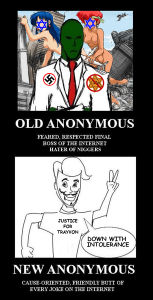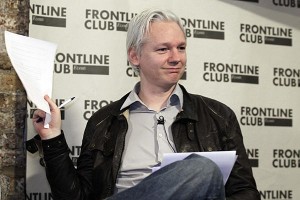
Pranks that required hundreds or even thousands of participants found a regular home at the anonymous humor forum 4chan, where the mythical Anonymous wrote the pranks as much as the pranksters wrote the myths. An all-powerful internet entity whose consciousness was constituted by thousands of individuals, Anonymous, resonated with the default anonymous forum, pranks, and powerless young people who made up the majority of the forum.
This mythical Anonymous and “his” many famous pranks formed a strong and mutually determinate relationship with “events” in the news media. Much early reporting on Anonymous pranks relied heavily on a naive (but sensational) reading of the sinister and all-powerful Anonymous mythology, creating a feedback loop which very quickly inspired emphasis of the powerful aspect, “hackers on steroids,” over the humorous. A distinct ideology and aesthetic constructed and were constructed by this feedback loop, and vestigial values of the prankish, leaderless, and mostly unmoderated 4chan forum became deflated and at times inverted as a consequence of hegemonizing processes — power must preserve and expand power to persist. The faceless green jokester splintered into a sea of Guy Fawkes masks and the Anonymous myth re-centered itself on power as power imposed itself upon Anonymous.
Free speech was a naturally shared value in the barely moderated realm of 4chan, but in this new culture where free speech was merely an initiative subsumed by power, such style of speech could not even be practiced internally. Because hierarchy and control of speech could not be implemented on 4chan, those who wished to continue to build power did so on Internet Relay Chat (IRC) channels. On 4chan, free speech was inherent everywhere, but in IRC it was everywhere limited by hierarchical channel moderators who acted to preserve their power. The weak response that anyone could create and control their own channel was the stock answer for complaints about the glaring absence of free speech. Rather than an open playground for speech such as 4chan, IRC servers were a place where anyone could set up controls for speech.
Internally, free speech was valued very differently, but differences were also externally manifest in the oft repeated claim that Anonymous would not (or should not) attack “media.” Media used here apparently meant something like news media, and one was left wondering if Anonymous preferred the “legitimate” and powerful news media over independent journalists. Certainly that wasn’t the case. Various Internet and communication media formed precisely the sphere in which relevant Anonymous operations obtained. Denial of Service (DoS) “attacks,” which were some of the rare instances in which post-prank Anonymous acted collectively and spontaneously, targeted communication systems of a subject of protest. Many supporters shared the common metaphor-as-argument which likened DoS to sit-ins. Unlike in the metaphorical sit-in, targeted systems (segregated restaurants) were necessarily less affected by the flood of packets (“sit-in”) than all the systems which relayed the packets (something more like blocking the streets everywhere near the restaurant).
Many of these historic DoS attacks were “successful” only with the use of botnets, or networks of cracked systems. Here, the myth of Anonymous fell into the tomb world of pure fabrication and in a sense was ultimately disconnected from its origin. There were often not enough participants in DoS “sit-ins” to achieve the goal of shutting down the subjects of protest, but that was no longer a central element to the culture or even a relevant point — power was more important. Those who participated acted merely as convenient cover for those who had botnets, thinking themselves part of a collective identity.
Leaders, figureheads, or celebrities also became pivotal actors despite the ideological insistence against this. Barrett Brown, a freelance writer, acted as an intermediary between Anonymous and the news media. After securing a “six-figure” book deal with perennial Anonymous enemy, Amazon, Brown was raided by the FBI and descended into something like a psychosis which came to a head in a series of YouTube videos in which Brown made threats to an FBI agent and his family. Brown was continually forgiven for his celebrity antics by many Anons who cited his contributions to their (fight against) power, showing more strong evidence that power was the central value, one which eclipsed even the eponymous value, anonymity.
Sabu, a prominent cracker, drew the admiration of tens of thousands of fans and acted as an organizer for “Antisec,” an Anonymous operation which purported to centralize and process information stolen from government systems around the world. However, Sabu was targeted by investigators specifically for his influence, which the FBI then wielded to direct crackers, such as Jeremy Hammond, to target systems which potentially provided the US with useful intelligence. This was an unsurprising climax for a culture which valued power above all else.


